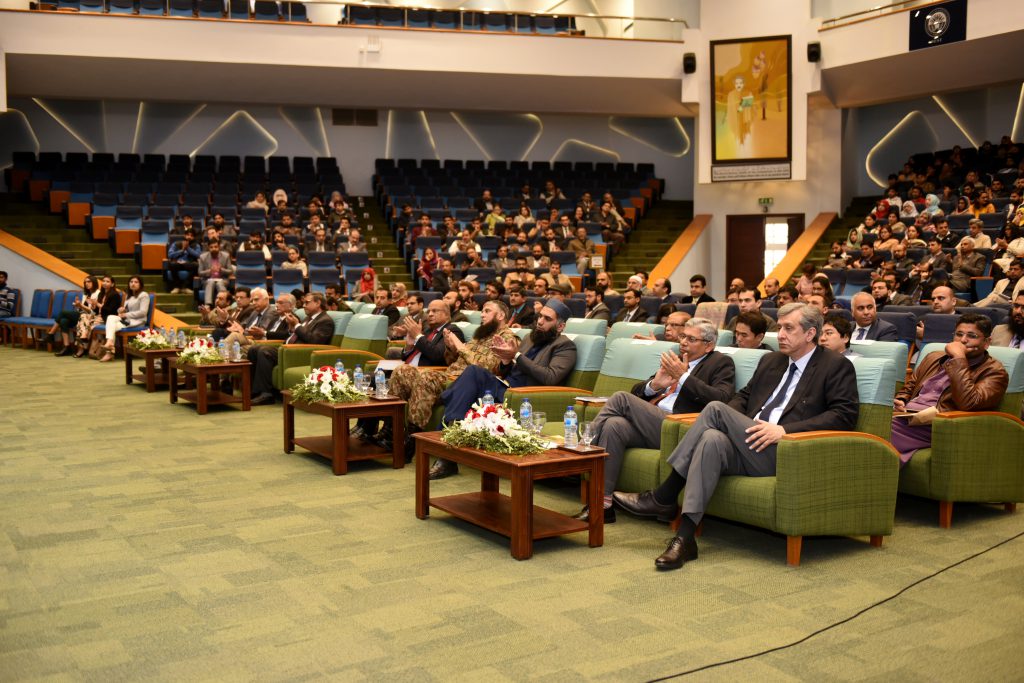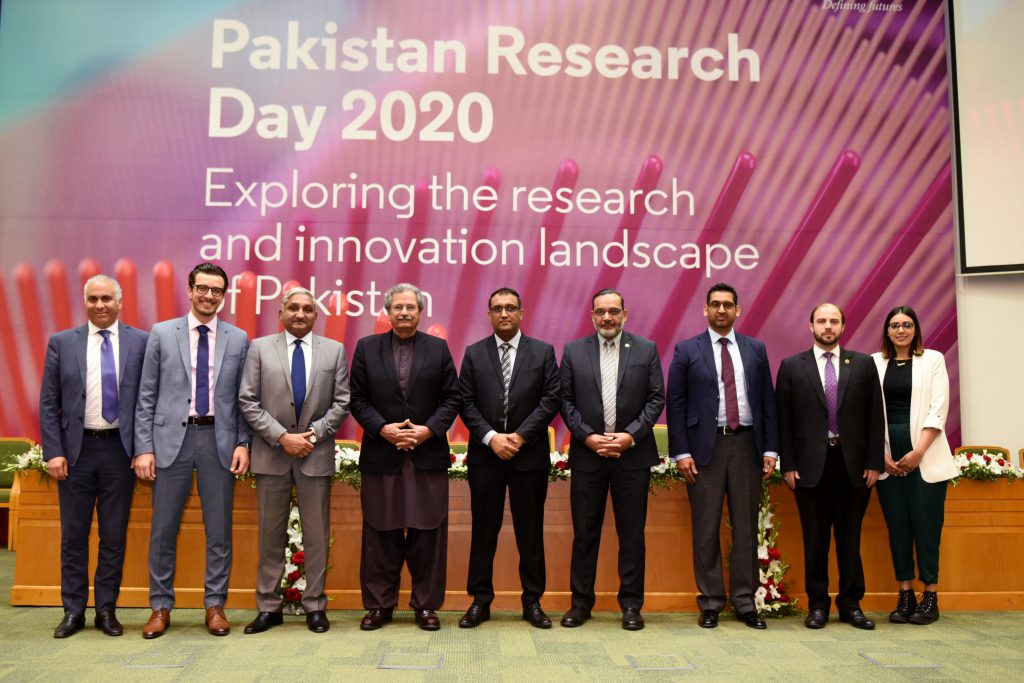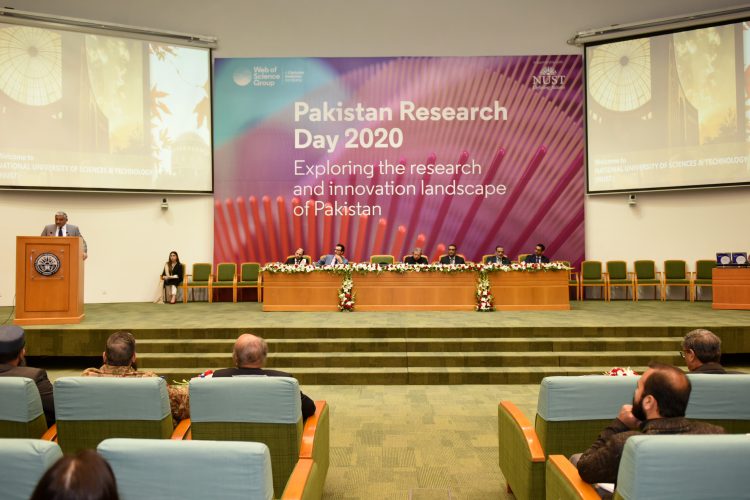First ever Pakistan Research Day 2020″ by the Web of Science, a Clarivate Group Company, was held at National University of Sciences and Technology. The occasion was graced by Mr. Shafqat Mahmood, Minister of Federal Education & Professional Training, members of the Higher Education Commission (HEC), and attended by over 300 attendees from the Pakistani research community from top universities and other government institutions. 
The day was marked to unveil the exclusive Research & Innovation Landscape Report that discusses Pakistan’s research productivity, which has increased by 300% since 2010.
Pakistan has observed an impressive increase in its scientific research productivity and impact which can be highlighted by the below mentioned facts:
- Pakistan’s publications indexed in the Web of Science’s Core Collection increased by 300% from 2010 to 2019. This 300% growth comprises of all types of research publications.
- Pakistan’s publications in top quartile journals have increased in the last 10 years as more than half of the Pakistan’s research was published in journals with Impact Factor. A total of 66% Pakistan’s scientific publications have been published in Journals with Impact Factor (JIF) which has seemingly increased the global influence of Pakistan’s research.
- Pakistan’s Category Normalized Citation Impact (CNCI) also increased from 0.67 to 1.03 in 2019. With the field world average being yearly normalized to 1, 2019 was the very first year for Pakistan which made it slightly above average.
- In 2018, 31% of all Pakistan publications in the Web of Science were published in Open Access publications. Pakistan is ranked globally at 44th position in terms of the total number of publications and 43rd in terms of the number of highly cited papers.
National University of Sciences and Technology (NUST) was also included in Pakistan’s top 20 universities and research organizations by the number of publications. NUST is ranked 5th in the list of these top 20 universities with the number of publications being 7,836 and Normalized Impact (CNCI) being 0.92 which is slightly lower than the world average of 1. For this, best practices need to be adopted that could lead to possible relevant institutional R&D strategy which is more consistent with the national requirements.
In terms of CNCI, majority of the Pakistan’s universities fall below the world average of 1 which indicates that Pakistan needs to increase the percentage of documents cited. A slight improvement on this indicator will reflect positively on the country’s overall research impact. A second area for improvement is the percentage of documents in top 10% in their field.
Whereas in terms of Intellectual Property, the filing of Intellectual Property in Pakistan is in developing stages and is being adopted by researchers who are generally glued with the legacy of ‘publish or perish’, while bearing in mind that the publications in journal or conference are well understood as research output. Over the years, the innovation activities from Pakistan is increasing but establishing Intellectual Property in academia might take some time for it to be well established in the research fraternity of Pakistan. In order to make progress with the filing of Intellectual Property, Pakistan needs to become a member of various research treaties for example Madrid Treaty, Paris Convention and PCT (Patent Cooperation Treaty) which is a league of 189 countries to honor patents filed in any country.
Driven by these factors the innovation landscape of Pakistan certainly does not reflect the true potential of Pakistan. According to the Derwent Research analysis; the current innovation landscape in Pakistan is focused primarily on technologies such as health, exercise equipment, games and computer technology. Therefore, Pakistan is currently ranked 105th in the Global Innovation Index ranking, with a total score of 25.37 points on the 100-point scale. Foreign institutes after analyzing the effectiveness of government efforts and their impact on the economy’s degree of development, have suggested a variety of activities to improve the innovation landscape in Pakistan. The activities leading to this improvement include: support mechanism for the establishment of research, development institutes and universities targeted oriented approaches in Research & Development along with a focus on a shift to indigenous patenting, especially for technologies coming from government investment in research & development and a focus on economic growth through innovation by creating a knowledge economy as part of the national strategy. In addition to this, WO Clarivate report is a commendable attempt to make the patent landscape of Pakistan a component of research as this would inculcate a new dimension for the country’s researchers to pay greater attention towards the Intellectual Property.
The event was concluded by a panel discussion on discussed future of research in Pakistan, an overview of the patent landscape, and how data driven R&D strategies could increase the potential of local research, moderated by Director Research NUST, Dr. Mohammad Ali Mohammad with the panelists namely Dr. Noshaba Awais- Director R&D (HEC), Dr. Ayman Akil- Head of Professional services – MENA, Clarivate Analytics, Mustafa Rasheed, Head of Sales – IP Group, Middle East, Africa & Russia, Clarivate Analytics & Dr. Nassar Ikram, Pro-Rector Research, Innovation and Commercialization (RIC), NUST.
The content for the blog was provided by two students, Hareem Ikram and Huzaifa Ikram, enrolled at National University of Sciences and Technology (NUST), under the supervision of NUST Research and Innovation Blog’s editor, Ms. Juveria Akhlaq, who can be reached at http://mgr.pubpro@nust.edu,pk






